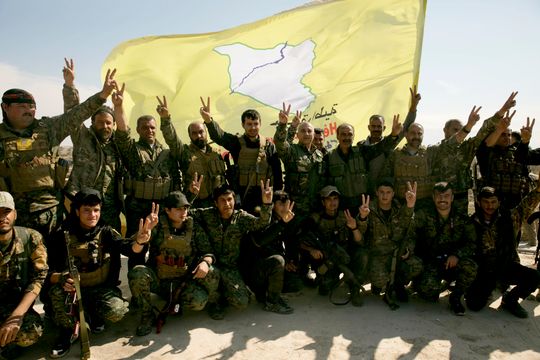Beirut: Sleeper cells, prisons teeming with jihadists, camps crammed with their wives and children – perils abound in Syria, nearly a month after the Islamic State (IS) group’s ‘caliphate’ was declared defeated.
The US-backed Syrian Democratic Forces announced victory over the IS proto-state, March 23, after a nearly five-year battle against the militant group. The elimination of the physical ‘caliphate’ closed a long chapter in the Syrian conflict, but the Syrian Democratic Force (SDF) and the US-led military coalition have warned the fight is far from over.
IS is still able ‘to carry out regular attacks on a weekly basis’, said Tore Hamming, an expert on jihadist movements at the European University Institute.
This week alone, IS militants have killed 35 fighters loyal to Syria’s government in 48 hours – feeding into a regime death toll over two days in excess of 60 at the hands of all jihadist factions – the ‘Syrian Observatory for Human Rights’ said. Before that, on April 9, IS claimed a double bombing that killed 13 people in the SDF-held city of Raqa.
The White House has said that it would keep 400 US troops in Syria ‘for a period of time’, after initially shocking allies in December by announcing a full withdrawal of 2,000 soldiers.
Hamming however, said this diminished contingent would struggle to deal with the lingering jihadist threat. “IS is still very active and will remain so. The small number of US forces will not solve that entirely,” he said.
Nicholas Heras, an analyst at the ‘Centre for a New American Security’, has warned that IS still holds sizeable sway over ‘networks of local support’.
“A big part of the IS strategy to re-grow is that it continues to have strong ties into some of the local tribes in eastern Syria and western Iraq,” he said, using an alternative acronym for the jihadist group.
As both regime and US-backed forces seek to hunt down IS sleeper cells on the run, the Kurdish authorities in northeast Syria face another major challenge.
Thousands of alleged jihadist fighters – including hundreds of foreigners – are now being held in Kurdish-run jails, while their relatives languish in overcrowded camps for the displaced. Their numbers have created a major headache for the semi-autonomous Kurdish administration, which now wants to put suspected jihadists on trial.
“We have called for an international tribunal to be formed to try these terrorists,” top foreign affairs official Abdel Karim Omar told this agency. “Our priority is to try the criminals,” he said.
Since 2014, IS fighters have been accused of carrying out beheadings, mass executions, rapes, abductions, and ethnic cleansing. They stand accused of stoning to death women suspected of adultery, and forcing homosexuals off the top of high buildings.
While many jihadists are now detained, they still pose a threat, according to experts. “These detention centres are becoming breeding grounds for radicalisation,” the ‘Soufan Centre’ said in a report published, April 12. “There is also a major risk of IS-engineered prison break attempts,” said the organisation, which specialises in security analysis.
